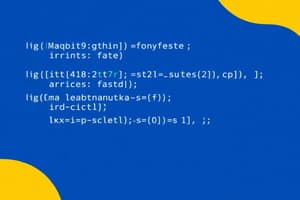Podcast
Questions and Answers
What is the associativity of the exponent operator ** in Python?
What is the associativity of the exponent operator ** in Python?
- Left-to-right
- Right-to-left (correct)
- Non-associative
- No associativity
Which of the following operators have non-associative properties in Python?
Which of the following operators have non-associative properties in Python?
- ==
- < (correct)
- **=
- +=
In the expression x < y < z, how is it evaluated?
In the expression x < y < z, how is it evaluated?
- (x < y) and (y < z) (correct)
- x < (y < z)
- (x < y) or (y < z)
- (x < y) < z
Which of the following is true about chaining assignments in Python?
Which of the following is true about chaining assignments in Python?
What is the output when x = 10 and y = 5 in the expression 'x - y > 0'?
What is the output when x = 10 and y = 5 in the expression 'x - y > 0'?
Which operator in Python has a higher precedence than OR?
Which operator in Python has a higher precedence than OR?
If 'meal == sandwich' and 'money >= 2' both evaluate to False, what will be the result?
If 'meal == sandwich' and 'money >= 2' both evaluate to False, what will be the result?
Flashcards are hidden until you start studying
Study Notes
Conditional Statements
- The
andkeyword is used to combine conditional statements, and both conditions must be true for the statement to execute. - The
orkeyword is used to combine conditional statements, and at least one of the conditions must be true for the statement to execute. - The
notkeyword is used to reverse the result of a conditional statement.
If-Statements
- If-statements are used to execute a block of code if a certain condition is true.
- The
ifstatement can be used with theelifkeyword to check multiple conditions. - The
elsekeyword is used to catch any conditions that are not met by the preceding conditions.
Nested If-Statements
- If-statements can be nested within each other to check multiple conditions.
The Pass Statement
- The
passstatement is used to indicate that a statement is a placeholder, and does not execute any code.
Loops
- There are two types of loops in Python:
whileloops andforloops. - The
whileloop executes a block of code as long as a certain condition is true.
Conditional Operators
- Python uses the basic logical conditional operators:
==(Equals)!=(Not Equals)<(Less than)<=(Less than or equal to)>(Greater than)>=(Greater than or equal to)
Assignment Operators
- Assignment operators are used to assign values to variables.
- Examples of assignment operators:
=+=-=*=/=%=//=**=&=|=^=>>=<<=
Operator Precedence and Associativity
- Multiplication has a higher precedence than addition.
- The
ANDoperator has a higher precedence than theORoperator. - Almost all operators have left-to-right associativity, except for the exponent operator
**which has right-to-left associativity. - Some operators like assignment operators and comparison operators do not have associativity in Python.
Studying That Suits You
Use AI to generate personalized quizzes and flashcards to suit your learning preferences.




